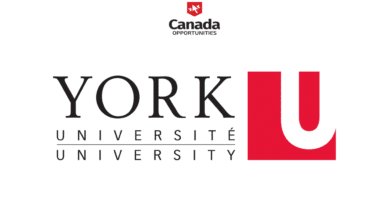Social Science Postdoctoral position at McGill University, Canada
Social Science Postdoctoral position at McGill University, Canada

Social Science Postdoctoral position at McGill University, Canada
Location: Either at McGill University in Montreal, QC OR at the University of Victoria in Victoria, BC.
Start date: October 2023 or as soon as possible.
Supervisors: Dr. Christina Hoicka (U Victoria), Department of Geography and Department of Civil Engineering, Canada
CANADA – Globalink Research Internship (GRI) program has been officially launched! – Don’t miss out on this opportunity
Research Chair in Urban Planning for Climate Change, Dr. Ali Seifitokaldani (McGill), Canada Research Chair in Electrocatalysis for Renewable Energy Production and Conversion.
Duration: 1 year, with the possibility of an extension for up to 3 years
ACKNOWLEDGEMENT OF TRADITIONAL TERRITORY: Social Science Postdoctoral position at McGill University, Canada
McGill University is located on land which has long served as a site of meeting and exchange amongst Indigenous peoples, including the Haudenosaunee and Anishinaabeg nations. McGill honors, recognizes, and respects these nations as the traditional stewards of the lands and waters on which we meet today.
The Electrocatalysis Lab of Dr. Ali Seifitokaldani in the Department of Chemical Engineering at McGill University is a young and fast-growing research lab being focused on electrocatalytic systems for renewable energy production and conversion.
Post-Doctoral Fellow-Power Systems and Renewable Energy – University of Saskatchewan
In the Electrocatalysis Lab, we combine computational quantum chemistry based on the density functional theory (DFT) with materials science and engineering to design and develop novel electrocatalysts for CO2 reduction, biomass upgrading, hydrogen production, and ammonia synthesis. Our group is composed of 5 PhD students, 4 Master students, and often hosts several passionate undergrad students throughout the year. We are going to add 4 to 6 postdocs and new grad students to the lab.
In our research group, teamwork is of the highest value and collaboration in different project is strongly supported, either within the group or with other research groups. We aim to foster the existing teamwork culture to enable everyone strive for excellence in their projects as well as their professional development.
Project:
This project is funded by NSERC Alliance. The research team aims to produce H2 at anode from biowastes
electro-oxidation, and the objectives of this project are to scale-up the technology, perform economic evaluation, assess the life cycle and model GHG emissions, and consider business development.
The collaborative team is made up of researchers and partners from McGill University, University of Victoria, McMaster University, University of Montreal, INRS, NRCan, Electro Carbon Inc., and CERT Systems Inc.
The focus of this position is to work with researchers and stakeholders to develop policy recommendations that support the implementation of the proposed technology to scale and to understand the specific characteristics of this technology to identify potential sites of adoption and potential communities and industries in Canada that can host, understanding the potential risks, benefits, and emission impacts.
This will involve qualitative research design and interviews with key
stakeholders, policy and regulatory document analysis and potentially media analysis.
Qualifications:
We are looking for self-driven and highly motivated postdoctoral fellows with an established track
record of success, including first-author publications, and with extensive experience in the area of interdisciplinary research settings, qualitative research for technology innovation and diffusion. This could be in the fields of science and technology studies; innovation studies; socio-technical and sustainability transitions; geography; business, or another related social science field.
The available positions are suitable for extraordinary candidates that unite excellent
qualitative and mixed research methods, oral and written communications skills, outstanding leadership, and expertise in understanding the theories, concepts and factors that affect the diffusion of technology into society.
Successful candidates are expected to publish in highly recognized journals in the field, foster their mentoring skills by dedicating a portion of their time to the supervision of graduate and undergrad students in the research group, participate in several ongoing collaborative projects and help with the development of the lab and new research directions, and to be able to prepare, organize, and submit proposals necessary for grant applications.
How to apply: Social Science Postdoctoral position at McGill University, Canada
Applicants must have completed a PhD in a relevant social science discipline within the last four years. Applications should be sent to Dr. Ali Seifitokaldani (ali.seifitokaldani@mcgill.ca) at McGill University and Dr. Christina Hoicka at the University of Victoria (cehoicka@uvic.ca). We accept applications until all available positions are filled, but the first screening will be done by September 15, 2023. Applications must include:
A cover letter describing the applicant’s expertise, most important accomplishments, and contribution to the field, motivation to do a postdoc, and a long-term plan for the professional career. It should also indicate the applicant’s status in Canada (citizen, permanent resident, under work permit, etc.)
Curriculum Vitae (CV)
A copy of the applicant’s bachelor and graduate transcripts, as well as a copy of diploma(s) or university
certificate(s).
The name and contact information including email addresses of three referees who have confirmed that they are willing to supply letters of reference upon request. “McGill values respectful and inclusive learning and work environments, which seek to identify and challenge historic and systemic barriers to full participation in university life and to foster discovery, advancement, and accomplishment, all of
which benefit our university and society more broadly.
Our institutional commitment to equity, diversity, and inclusion (EDI) acknowledges and seeks to address the lasting effects of historic injustices that continue to challenge equal opportunities to access, and to succeed within, the McGill community. Our community recognize that excellence is fostered by bringing
together individuals and groups of diverse experiences, identities, and ideas …”.
As such, we welcome and encourage applicants from all federally designated groups and persons with limited abilities, to consider applying for these positions. All qualified applicants are encouraged to apply; however, in accordance with Canadian immigration requirements, Canadians and permanent residents will be given priority.
Salary: The salary for this position will be commensurate with experience.
FOLLOW OUR SOCIAL MEDIA CHANNELS
LINKEDIN, FACEBOOK, WHATSAPP, TELEGRAM, YOUTUBE
Post-Doctoral Fellow-Power Systems and Renewable Energy – University of Saskatchewan




